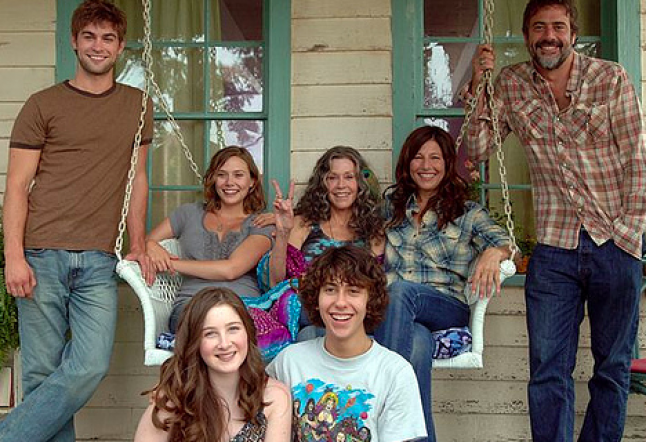peace, love and misunderstanding

Peace, Love and Misunderstanding is a family drama that quickly departs from the upper middle class echelons and reality of Manhattan to run pell-mell into the unconventional and completely surreal chaos of countercultural Woodstock.
The familiar trope of the unhappily married woman with kids who chooses to take a walk on the wild side when faced with the misery of her matrimonial existence is injected with a shot of something a little different; hippydom. And its queen who reigns supreme is flower-power grandmother Grace, beautifully played (in seamless self-parody) by Jane Fonda. Diane, (Catherine Keener), the long-suffering uptight protagonist who has lost her soul and her rock and roll seeks to rediscover both by fleeing with her kids Zoe (Elizabeth Olson) and Jake (Nat Wolff) to visit her mother, Grace, at her hippy abode/pot-growing paradise. Each of these city-dwellers is brought back in touch with a part of themselves previously unknown or long-since forgotten, and they walk their respective paths to a heart-warming collective conclusion.
Although the characters at first seem a little stereotypical- the obsessive, overworked tight-ass lawyer, the pretentious aspiring young writer, the socially inept geeky genius child- Beresford’s cast are so animated that you can’t help but find them all charming. Fonda and Olsen in particular do an excellent job of making their characters’ habits of peddling platitudes and labouring lofty ideals seem endearing. They feel like real people who have been airlifted from the real world and placed in a 1970s utopia where peaceful protest, bring your own bong parties and all female moon celebrations are perfectly normal.
Sure, a large part of the spiritual growth that Diane and her two kids undergo is linked to the emergence of an unlikely romantic pairing; Diane with the insightful, loveable rogue Jude (Jeffrey Dean Morgan), Zoe with the cleaver-toting but compassionate village butcher Cole (Chace Crawford) and Jake with old soul in a young waitress’s body, Tara (Marissa O’Donnell). But this is in fact where the film most excels, in its depiction of relationships. Diane, Zoe and Jake relearn the importance of being open to the possibility of love, and in addition that love may come in a form as far removed from their expectation as humanly possible.
Woodstock feels magical, and actually showcases the best aspects of an unconventional community. Spontaneous music-making, polite but lively humanitarian debates and chickens picking their way between laptops and coffee cups all make for a beautiful backdrop. While it may be a somewhat romanticized portrait of living closer to the earth, there is an unmistakable atmosphere of fun and freedom that inspires nostalgia for simpler, happier times.
One character asks, “What is any film really about?” Although strenuously trying to avoid the trap, here’s one small insight: the universality of life, the oneness of human beings. In a film where each generation speaks to the other in different languages (brilliant moments such as middle-aged Diane’s horror at her seventy plus mother’s use of the word ”˜cockblock’) but somehow end up coming to some kind of understanding, the film inspires hope that despite our differences, it is possible and indeed necessary for our sustained happiness to overcome them and reconnect.
Peace, Love and Misunderstanding is a new kind of feel-good film; there’s a smile on your face, but the real happiness resides somewhere much deeper.
Read next >> Looking into a Mirror, Connecting with a Friend
